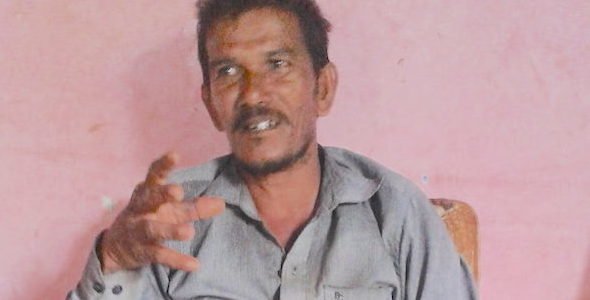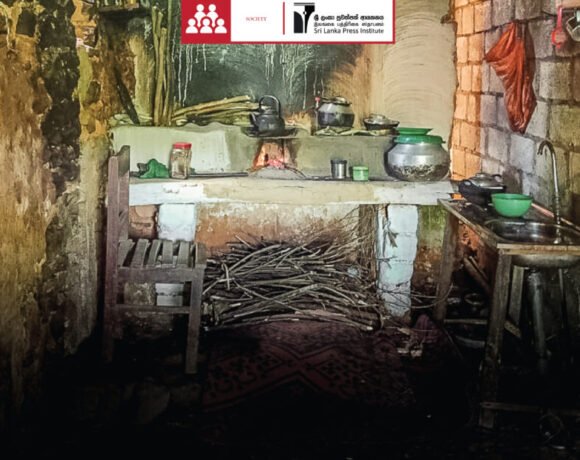
The Easter Sunday Aftermath in Ampara “I bartered fish for jack fruit. All that is ruined now”
Z.A. RAHUMAN
In the aftermath of Easter Sunday’s attacks, we wanted to gauge its effects on people around the country. We spoke with a trader from the Amapara District recently to understand the impact on people in his areq. “I was doing a barter business. I took things from this area to sell to the Sinhalese who lived about 30 to 35 km away. In turn, I bought goods from them to sell to Tamil and Muslim people in our area. All that is ruined now…” he said. Ahmad Lebbe Yakoob, 57, of Sainthamaruthu in the Ampara District had been doing business with all three ethnic groups for nearly 20 years now. Here is our interview with him.
In the aftermath of Easter Sunday’s attacks, we wanted to gauge its effects on people around the country. We spoke with a trader from the Amapara District recently to understand the impact on people in his area. “I was doing a barter business. I took things from this area to sell to the Sinhalese who lived about 30 to 35 km away. In turn, I bought goods from them to sell to Tamil and Muslim people in our area. All that is ruined now…” he said. Ahmad Lebbe Yakoob, 57, of Sainthamaruthu in the Ampara District had been doing business with all three ethnic groups for nearly 20 years now. Here is our interview with him.
The Catamaran: What kinds of goods are being traded by you?
For about 5 years, I have been buying coconut and jackfruit from the Sinhalese in the Ampara and Uhana areas, and sold them to Muslim and Tamils in our area. Then, over the last 15 years, I made a small change in my business. I started buying fish from Muslim fishermen in Sainthamaruthu and took it to Sinhala areas and bartered them for essential goods such as coconuts, jackfruits, lemons, guavas, mandarins and also other things that were needed by people in our area. Business was going well at that time. But all that is ruined now.
The Catamaran: For how long has your business been affected?
Since Easter Sunday and over the last three months. I have not been able to work. It was frightening and distressing to do business with the Sinhalese. The same was true in Tamil areas as well. After that I started doing a little bit of business with Muslims and Tamils. I am waiting for the day I could resume business operations with Sinhala communities like I did before.
The Catamaran: You mentioned that you couldn’t do business for a certain number of months. How have you managed without this?
I am a father of 5 children and we live off my daily income. I used to work as a labourer for a daily wage as well. But this is not enough to sustain my family. So, I have had to borrow money from relatives and friends to get by.
The Catamaran: What is the current situation?
Even though there is no direct impact of the attacks on them, the Sinhala people in the area look at us with suspicion because of the racist comments of politicians and religious leaders, and also due to hate speech and fake news spread in the media. It is also a matter of mental distress that people who previously spoke to me with affection are reluctant to interact with me now. They do not have complete confidence in us yet. Even the Tamils do not speak to me like they did before. They would buy fish from me and move away quickly without much talk. I do not know what their feelings are. What worries me most is that the actions of a small group with Muslim names have affected the peace, friendship and livelihood of the people.
The Catamaran: How do you think these challenges can be addressed and inter-ethnic harmony created?
I was doing businessman even during the LTTE war period. Today there is a psychological conflict, so we have to win the minds of people through a confidence building process. Most Sinhalese are good people. Nowadays they show resentment because of hate speech and unethical media practices. We must stop hate speech. Social media propaganda is spreading rapidly. This means social media users must learn to act responsibly online. Generally speaking, harmony can be brought about by controlling fake news. What’s more, politicians and religious leaders are only concerned about their own communities. They do not think about other communities and living in peace with other ethnicities.
The Catamaran: What do you think you can personally do to promote reconciliation?
I move with everyone in a friendly manner – and not just for business purposes. I approach everyone with confidence and friendship. That’s all I can do. I wake up every morning with great hope that the present situation will change. For those of us who are in trade, it is a must that communities live together. It is impossible to live apart from one another. Everyone should keep this in mind.
This article was originally published on the catamaran.com








